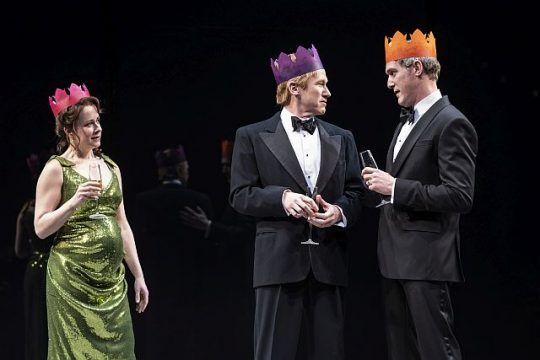
3 stars
How you react to “The Winter’s Tale” at Goodman Theatre depends on if you like an intensely acted, disturbing tragedy immediately followed by a whimsical, comedic romance that tries to make the tragedy all right in the end.
Among William Shakespeare’s (1564-1616) late plays (published in the 1623 First Folio) is “The Winter’s Tale” which combines many of his themes such as murderous jealousy as in “Othello” with comedy and romance similar to “A Midsummer Night’s Dream.”
Expect to see unconscionable actions and reactions during the tragedy but Act I ends with a foretelling of funny things to come by a bleating shepherd and his son followed by the personification of a wildly announced “Time.”
Basically, when longtime friend Polixenes, King of Bohemia cuts short his visit to Leontes, King of Sicilia, because of kingly duties, Leontes asks his very pregnant Queen Hermione to convince Polixenes to stay. But after she does so Leontes decides they are having an affair.
He has her thrown in the dungeon, he asks Sicilian Lord Camillo to poison Polixenes and when her baby girl is born he asks Lord Antigonus, husband of Hermione’s friend, Paulina, to abandon the child far away.
To top it off, their Delphos Oracle’s missive proclaiming Hermione’s innocence comes and says Leontes will be without an heir until he finds his daughter. His young son, Mamillius dies because of his mother’s treatment just as Leontes tears up the missive. After Mamillius dies Hermione swoons and dies.

Meanwhile, a storm breaks up Antigonus’ ship on Bohemia’s shore as he tries to shield the baby, he named Perdita (suggested from a ghostly visit by Hermione), from a bear. He teases the bear away who then chases him offstage. The baby is found by a silly shepherd and his son, Clown.
Now the action in Bohemia flies ahead 16 years as proclaimed by “Time.” Perdita and Polixenes’ son, Florizel, meet and fall in love. Polixenes is upset that his son wants to marry a poor shepherd’s daughter. He intervenes in their marriage ceremony and forbids it. So the couple flee with Camillo who had been living in Bohemia and wanted to leave, anyway. They sail to Sicilia with the Old Shepherd and his son.
When Florizel and Perdita arrive they are greeted by Leontes who is still repenting his wife and son’s death and his own behavior. Florizel is supposed to be on a diplomatic mission but that doesn’t work when Polixenes arrives.
They all reconcile, learn of Antigonus’ death by the bear and Leontes asks for forgiveness. They visit Paulina who has a statue of Hermione. Leontes is upset but then the statue comes to life and Hermione is back, but not Prince Mamillius.

What makes this Goodman production fascinating is the way artistic director Robert Falls re-imagines the two stories by paring the play down to two hours, 15 minutes in a way that highlights what he sees as stand-out points.
His creation comes to life with Walt Spangler’s clever set design for Act I and fantastical designs for Act II, Ana Kuzmanic’ costumes, plus the extraordinary chewing of scenery by Dan Donohue as King Leontes, the fine acting of Kate Fry as the tragically misunderstood Queen Hermione and the exceptional performance of Christiana Clark as Hermione’s friend, Paulina.
Falls has turned a Shakespearean play I’m not fond of into a production worth seeing.
DETAILS: “The Winter’s Tale”is at Goodman Theatre, 170 North Dearborn, Chicago, through June 9, 2019. Running time: 2 hours, 15 minutes with one intermission. For tickets and other information call (312) 443-3800 and visit Goodman Theatre.
Jodie Jacobs
For more shows visit Theatre in Chicago
